
36 minute read
Cover: Isabel Estate’s Nick Best and
Water Ways
Good ideas flowing at Isabel Estate
Advertisement
SOPHIE PREECE
WHEN JEREMY McKenzie took over at Isabel Estate in 2014, the Renwick winery was under the pump when it came to winery waste water. Turning that around, while growing the operation from 450 to 1,800 tonnes, has been about a trickle of changes not a flood, with a continuous improvement programme on a modest budget, says the company’s chief winemaker. “We have done it quite strategically.”
Winery and operations manager Nick Best, who joined Isabel a year after Jeremy, told attendees at the Wine Marlborough winery waste water workshop last month about a series of changes made at the company, from creating a new area for waste water irrigation, to ensuring better capture of storm water. Nick reiterated that it was about working smarter, without a big capital outlay, and being prepared to catch the “curve balls” that inevitably fly through when it comes to winery waste. That included visiting wineries around the country to see what others were doing. “Obviously, it’s not the biggest or best system, but it works for us and the number of staff we have,” Nick says.
The company began by increasing its storage capacity and changing its waste water irrigation to K-Line, while also aligning its technology to capture quantity and nutrient information. They also looked to relieve pressure on a site previously used for all the
Matt Oliver
Nick Best and Jeremy McKenzie in an area irrigated by winery waste water. Photo by Jim Tannock
winery’s waste water, so cleared gorse, old man’s beard and blackberry from beneath an existing grove of oak trees on a river terrace on the 50-hectare vineyard.
Having cleared the weeds, the team ripped the soil to soak in grasses, before putting in place solid set irrigation and sprinklers for waste water disposal. They tied the new section in with Isabel’s existing monitoring technology, ensuring Nick has all the discharge data, including information required in reports to the Marlborough District Council (MDC). Meanwhile, the original waste water site was assessed, treated with gypsum and given time to come back into nutrient balance, so that the two sites can be rotated. “We now have 3.6ha of irrigation paddocks,” says Nick. The development also included off-takes from the terrace, so that in the case of a flood the company can irrigate up onto the headlands instead.
Isabel has improved its storm water systems, and any new concrete areas, buildings or warehouses will align with that pipeline, ensuring clean water is not going through the waste water process. And working with the winery team to ensure the right use of chemicals, including using less caustic soda, was key to reducing the output, says Nick. “The first year we started to do that we really saw a change.”
Isabel received a new resource consent before the 2020 vintage, following discussions with council staff on the best way to progress under the proposed Marlborough Environment Plan. Jeremy describes the company as something of a “guinea pig” in that process. “We have increased the consent to future proof ourselves - not significantly to the large or medium winery level, but enough to gain some efficiencies and give ourselves a bit more scope in operation “
And the continuous improvement of the vineyard continues, with a successful application to MDC’s Working for Nature/Mahi mō te Taiao fund, and plans for native plantings, including along the vineyard’s waterways. That’s the next stage of the process, says Jeremy. “It’s about the health of the site.”
Wineries work on winery waste
THE WINE industry should be aiming well above compliance when it comes to its waste water, says Marlborough District Council environmental scientist Matt Oliver. “It would be really easy for industry to go for best practice and not just the bottom line,” he told industry members at a crowded Wine Marlborough winery waste workshop last month.
Council monitoring programme coordinator Rachel Neal revealed results of monitoring in 2020, in which nearly half the Marlborough wineries were fully compliant with their waste discharge conditions, with 47% given a green light rating. Another 21% of wineries (eight of the 38 monitored) were rated technically non-compliant, which meant the breach, such as a failure to keep records, did not impact on the environment. Nine of the wineries rated non-compliant failed on just one condition or rule, and lifting standards to and above compliance would be “easy to fix”, says Matt.
The workshop included simple advice on improving waste water compliance, starting with operators taking time to talk to the duty planner, monitoring team or environmental scientists at council, regarding better operations or resource consent applications. Matt’s “dummy’s guide” to the Marlborough Environment Plan discussed considerations wineries should take when looking at the nutrient loading of their water, including whether increased production and increased water efficiency could be changing the waste water output.
Both Rachel and Matt emphasised the need to provide accurate and timely records to council, as consents could be breached as a result of an administrative slip. Matt also gave advice on waste water lots utilised by wineries, warning that grazing a paddock with a high potassium loading could result in losses of nitrogen, as the salty pasture resulted in stock urinating more, exacerbating nutrient issues. Instead, when the potassium reaches high levels, operators should cut the hay to be sent off-site. If the sodium levels get high, advice should be sought on the use of gypsum to mitigate the load, says Matt Grasses and mixed swards are an ideal way to soak up the nutrients from waste water, but it is important that the lot be irrigated before harvest, if necessary, so plants are thriving and able to do their job. It’s also important that the waste water irrigation be measured, so the water doesn’t drain below the root area. While some wineries have wood lots for winery waste, they are less successful than grasses because the nutrients cannot be exported through hay, and the soil invariably ends up with too much potassium, he says. Tree lots also become too shaded, resulting in less evaporation. However, there are opportunities to use some winery waste water to irrigate amenity plantings, as long as compliant with consents. “We should be looking at this as a resource instead of a problem,” Matt says, noting that one of the region’s major issues going forward is a shortfall in the water available. “We are discharging an awful lot of water.”
Wine Marlborough general manager Marcus Pickens says there is strong industry interest in ensuring better compliance results in the region. “We just need to lift our game.” Wine Marlborough will establish a winery waste water industry working group to develop best practice guidelines, and will bring the industry together again in spring, to share learnings and opportunities. The February 2021 Winepress has a guide for waste water, grape marc and leachate disposal. For more information, contact the council’s monitoring team on 03 520 7400 or monitoring@marlborough.govt.nz
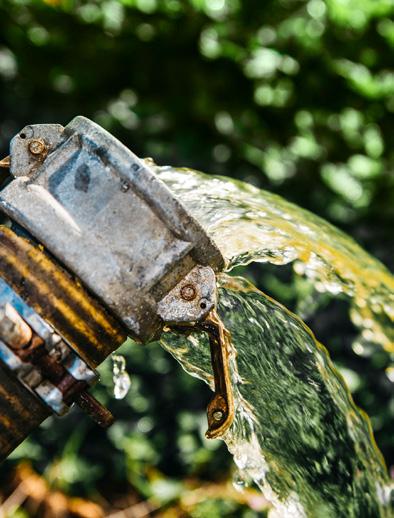
Rapaura Springs treated waste water
Top Tips
• Set up a soil testing control site on your waste water lot to monitor changes over time • Ask the lab processing your samples to email results to council directly, reducing time lags • When applying for consents consider growth plans, so your future waste water needs are met • Ensure winery staff are using the correct rates of cleaning chemicals at source • When considering a consent application, check out consent conditions of similarly-sized wineries, available through smartmaps at marlborough.govt.nz • Consider discussing your situation with council prior to applying for consent, to get a better understanding of the relevant rules and requirements
Head + Heart
Nicci Armour and the good work of science
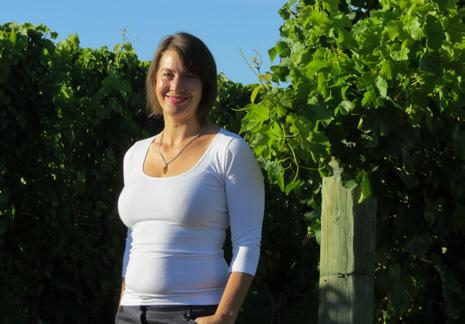
SOPHIE PREECE
NICCI ARMOUR has spent her career problem solving for people and communities, one puzzle piece at a time. “I think that’s why I became a scientist,” says Wine Marlborough’s new advocacy manager. “I think I can figure something out or add a useful perspective that can help.”
A natural empathy and scientific curiosity saw the Southland farm girl study biological sciences, then undertake a PhD in family cancer genetics at the Queensland Institute of Medical Research in Brisbane and University of Queensland. “I just like the puzzles of genetics,” Nicci says. “I had lost my nana to breast cancer a few years beforehand, so that was kind of the driver when I was looking for research projects.”
Her studies saw her identify and describe a new cancer syndrome and then map the genetic region involved. When she finished her PhD, Nicci continued to pull the thread of her findings, working with a local surgeon and collaborating with clinical geneticists, pathologists, gastroenterologists and national and international research groups to develop the work in oesophageal cancer, gastric cancer, and melanoma, and understand its implications for patients. “And that to me was interesting,” she says. “Most scientists are naturally curious. It went from ‘I wonder why?’ to ‘what does this actually mean?’” It wasn’t about curing cancer, she notes, but about better understanding the role genetics plays in treating patients, and their outcomes. And it came with “I need to understand what matters to our members… What keeps them up at a realisation that she night?” wanted her work to be focussed on “making a Nicci Armour difference”.
After five years, with a toddler at home and the recent arrival of a new baby, Nicci stepped back from the research programme to focus on family. She and her husband David Armour, a “plant geek” with a PhD in plant breeding, moved to Tauranga for a new stage of their lives. “It was wonderful. Five years focussed on the kids, and exploring who we are as a family, and seven years primarily at home,” she says.
As their children grew up, Nicci “transitioned” back into the workplace, knowing she wanted to try something new, but still be positively impacting on her community. That included a year working on housing projects, “having realised how important housing is to the fabric of our society”. She was well aware of her family’s fortunate situation, and of the tough times faced by so many others, largely because of housing insecurity in New Zealand. Her work with a Tauranga start-up focussed on creating cohousing communities and exploring the possibility of that as a model for housing development.
Having laid down the strategy, vision and “long-term pathways forward”, Nicci passed on the role, so she and David could begin their own horticulture consultancy, Growlab, in a new problem solving journey. The company
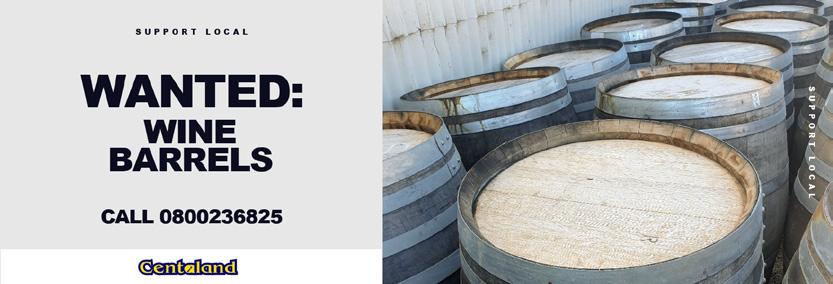
was largely focussed on kiwifruit and avocado, “and understanding how privileged we were as scientists to understand how things could be done better, and could access information to quickly work out how to do things better”, she says. One aspect of Growlab was co-developing innovation projects with individual businesses, including as a conduit to collaboration with external research bodies. They also worked closely with growers to identify what they needed, in terms of technology and transformation. Nicci says they had seen a disconnect between the research being undertaken and the opportunities that could be leveraged for growers. “We were working directly with grower groups to find what they needed and, as a start-up, what we could develop with them that would put tools in their hands to help them do their jobs better.”
The innovative model, launched in 2019, was already ahead of its time, “leading from the edge”, then suffered a hit from Covid-19 last year. That timing, as well as a series of personal blows to the family, meant the couple were ready to press pause on Growlab and look for a new opportunity.
Tauranga’s loss was Marlborough’s gain, when David accepted the role of research programme manager at the Bragato Research Institute and the couple decided to move to Blenheim with their three children. Having the Wine Marlborough advocacy manager role come up soon after was just the serendipity they needed, and Nicci sees both roles as another opportunity to ensure science, technology and information create positive outcomes on the ground, and are informed by industry needs.
She’s keen to get out and experience wine industry roles first-hand, so any advocacy is carried out with a deeper understanding of the industry. “If there’s a community call-out to help with labour, I’m there.” Without a genuine connection to the people impacted by labour shortages, for example, she wouldn’t be able to share authentic stories on their behalf, she adds. “From an economic perspective, yes we can make the case… And from a data perspective we can make the case, but it’s not just about that. I think that human element is critical, going in both directions.”
Connecting with Wine Marlborough’s members is “very much where my heart is at” when it comes to understanding the role, says Nicci. “Of course, there are a lot of Government people to meet and a lot of stakeholder groups to understand and figure out. But first and foremost, I need to understand what matters to our members… What keeps them up at night?”
Stop Botrytis in its tracks
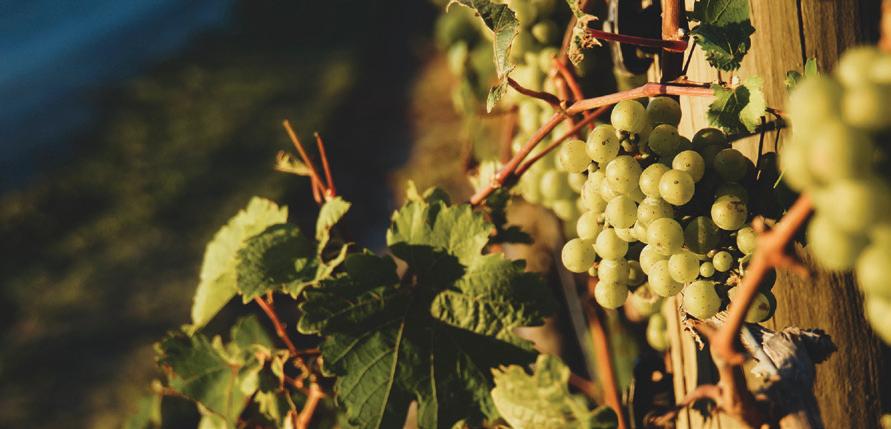
BioStart TripleX biofungicide
» Prevents and controls botrytis by using a naturally occurring opponent to these fungi » TripleX is compatible with a range of other sprays » Now certified organic » Available from leading Horticultural Suppliers.
0800 116 229 biostart.co.nz
BIOS 097
Jules Taylor
New Zealand Winemaker of the Year
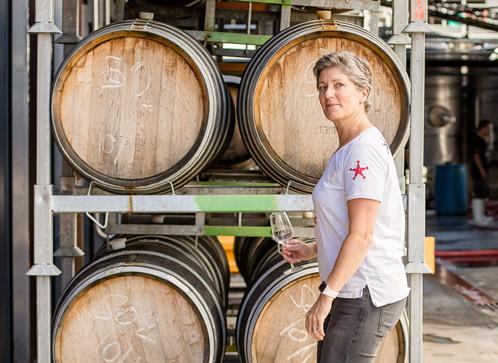
SOPHIE PREECE
“I am super chuffed “WE’VE COME a very long way from standing around the builders’ block at the and super proud. I love Spring Creek Playcentre,” says Jules Taylor, Gourmet Marlborough and everything Traveller Wine’s 2021 New Zealand Winemaker of the Year. The “we” is the founder of Jules Taylor that goes on here.” Wines and her one-time carpentry companion Ben Glover, winner of the Gourmet Traveller Wine Jules Taylor Leadership Award, some 45 years after they hung out at Playcentre. The award is a delight, but she’s embarrassed to have
Come a long way indeed. “Jules is one of New Zealand’s beaten the other nominees, who are “so great and so modern pioneers,” said the judges in the awards. “She innovative and cool, and doing really interesting things in produces outstanding wine, is fiercely proud of her region, this space”. And she repeatedly points out that the success and mentors the up-and-coming breed of Kiwi winemakers.” of Jules Taylor Wines doesn’t come down to Jules Taylor That’s a “really nice recognition of all the bloody hard work alone. “It’s a big old team effort. There have been a lot of that’s gone into this”, says Jules. “I am super chuffed and people along the way, helping out with all sorts of stuff.” super proud, I love Marlborough and everything that goes Without good growers and the viticulture team and “the on here, so that’s kind of cool too.” winemaking guys that babysit those bunches when they
Back in those Playcentre days in the 1970s, grapes come in” she wouldn’t have great wines, she says. were beginning to flourish in Marlborough. And by 1990, Jules has long been a proud champion of Marlborough when Jules left for a Bachelor of Science at Canterbury Sauvignon Blanc and is making the same style as she was University, studying zoology and plant microbial science, 10 years ago, “cause it’s not broke”, she says. “I mean sure, vines were transforming the region. With her science degree we are exploring other styles of the variety to make it more and unabated curiosity in hand, she went on to Lincoln accessible for a wider audience – those people who hate University, to study viticulture and winemaking. the classic in-your-face style. They might enjoy that more
Jules initially planned to become a viticulturist, but was textural and slightly more complex barrel ferment.” soon hooked by the metamorphosis of grapes to wine, along But plenty has changed over the past decade, with with the “craziness” of her first vintage in 1994. When she’d the couple buying their own vineyard and leasing finished her studies, she worked hard to get a footing in another, while building partnerships with distributors and Marlborough’s industry, becoming one of New Zealand’s few customers around the world. Relationships, says Jules, are women winemakers, then setting off for vintages in Italy, key in whatever you’re doing, in any industry. And her spending nine years alternating vintages in Marlborough commitment to the people, industry and region she works and Italy, including five harvests in Sicily. with have earned her a reputation for more than great
Jules and her husband George Elworthy launched their wine, said the Gourmet Traveller Wine judges. “The respect own label in 2001, with 400 cases of Jules Taylor Wines, and and mana that Jules has in the New Zealand community have spent the past 20 years growing the brand. It’s taken a is as much a reflection of the wines she makes as it is the lot of gumption, she admits. “It’s about believing in yourself contributions she is making to the country’s industry.” and taking a punt. No one got anywhere without risking The award comes at the end of a “complicated” Covid something.” That comes with plenty of sleepless nights. “We year, and on the cusp of a “really low harvest,” Jules says. started with nothing – or less than nothing - so it’s been a “It’s going to be really interesting what happens. We just long road. But I don’t think I would change anything.” have to work together with people. We will know at the end
of harvest how much we have got, then it’s about allocating that out in a fair and equitable way, looking after the people who looked after us. That’s important.”
Meanwhile, the fruit is clean in loose bunches, and ripening rapidly, due to small crops. “It’s going to come in fast and be over with a hiss and a roar.” They’re the kind of seasonal vagaries that may bring sleepless nights, but also provide the “beauty” of the industry, Jules says. “It’s not the same every single year or month or whatever…it makes it interesting.”
Crafting Community
WHEN BEN Glover established The Coterie with Rhyan Wardman in 2018, he envisaged “kitchen table collaborations” amid an ethos of collegiality. Building community is a harder task than ever, given Marlborough’s ever-expanding wine industry, but the crew at The Coterie – a contract winemaking facility devoted to smallbatch organic wines – work hard to protect and nurture connections, he says.
It’s the kind of outward looking perspective that has seen Ben awarded the Leadership Award at the Gourmet Wine Traveller New Zealand Winemaker Awards 2021. “Winemaker, wine judge and businessman: there’s nothing Ben doesn’t know about the New Zealand wine industry,” says the awards blurb. “His sense of humour, storytelling and passion for making fine wine are surpassed only by the love he has for his family.”
Ben, who is the winemaker behind Glover Family Vineyards and Zephyr Wines, started out as assistant to Brent Marris at Wither Hills in 1998. In the 22 years since, he has forged a reputation as a winemaker, wine judge and industry stalwart, who’ll typically put up his hand to help events and people within and outside of the wine industry.
Ben says wine judging – including as chief judge for this year’s Marlborough Wine Show, as Cuisine Magazine’s lead judge and as co-chair of the New Zealand Wine of The Year Awards – has been an important part of giving back to the industry, growing collegial activity and nurturing the talents of “passionate enthusiastic young wine people”.
He was also chair of Pinot Noir 2017, but says establishing The Coterie was probably his most “concrete step” into helping the wine community. Looking away from his own wines and work to support others was much easier when he was employed by a major company that could “afford you the time”, rather than running his own business (or three), he adds. “I am working a hell of a lot harder and smarter than I was five or six years ago, but it’s great seeing such talent and enthusiasm involved in the Marlborough region and New Zealand wine as a whole”.
Marlborough’s wine industry has provided a “great bunch of people” to work with, he adds. “They are solutions orientated – always say ‘yes’ first and then think about how they can achieve their goal.”

Independent Bin Supplies
• Pallet Bins • Insulated Bins • Process Bins • Cherry Pails • Harvesting Bins • Fish Bins/Crates • Wheelie Bins
Based in Christchurch IBS have been distributing quality rigid industrail plastics since 1997
www.independentbinsupplies.co.nz 0800 21 45 49
Spray Stations
Steve Crockett
BRENDA WEBB
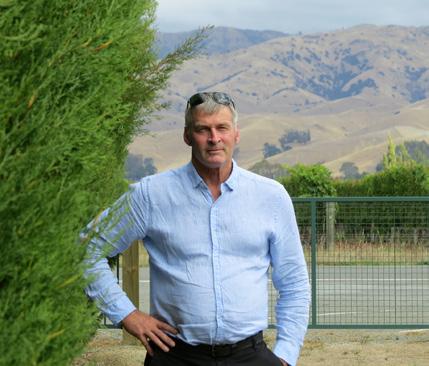
SPRAY DRIFT monitoring stations could be set up throughout Marlborough, in line with air sampling programmes around the world. Specific monitoring sites suggested in an Envirolink review, carried out by Lincoln Agritech, include Fairhall School, given its close proximity to vineyards. Principal Steve Crockett says he is aware of potential spray drift issues from vineyard activity, but praises neighbours for not spraying during school hours and letting the school know their spray programme. “Our neighbours are very good at communicating with us.”
While there have been no concerning results from testing done by the school, or any reports of concerns of adverse effects, they were constantly looking at ways to ensure the environment was a safe one, he says. Steve has already met with the Marlborough District Council (MDC), which initiated the review, and openly supports installation of monitoring devices, but says further decisions would come from the Ministry of Education.
Fairhall School has a solid 4-metre macrocarpa hedge as a buffer to the nearest vineyard on the eastern side of the playing field, while the vines at the back of the school have a headland and drain between them and the school fence.
The Envirolink review considers technologies and suggestions for future research that could develop a viable solution to the possible issue of spray drift. It has previously recommended a long-term monitoring system used in California be established in New Zealand. That system pulls air through filter paper and foam or resin, so concentrations can be calculated.
California provides a good model for Marlborough, with a similar urban-agriculture edge issue, says the report. California has had a thorough pesticide use report system in place for more than 25 years, requiring applicators to supply information including active ingredients, amount application, application method and location.
The main focus of any monitoring would be to look at how far pesticides travelled through the air under Marlborough conditions, says the report. Buffer zones are one way of eliminating spray drift – in France, 10m no-spray buffers between vineyards and schools are recommended. Regional councils in New Zealand have leeway to adapt to local concerns, but the report recommends the buffer be no less than 3m, and for vineyards close to vulnerable places such as schools additional protection measures should be used such as hedges, using low drift spray equipment and avoiding school times.
Changes to no spray buffer zones in France and California showed that improved equipment could reduce spray drift by up to 70%, while hedge rows reduced drift around 90%.
The most widely used application in New Zealand vineyards was elemental sulphur, which protects against fungal disease. Studies showed it was effective and of low toxicity, but while sulphur was naturally present in food and soil, breathing sulphur dust could irritate airways. The cost of the monitoring system was an issue, with the review noting the initial cost of a high-volume air sampler was at least $6,000 plus the ongoing cost of pesticide extraction and chemical analysis.
Wine Marlborough general manager Marcus Pickens says there have been huge improvements in operator behaviour over the years. “Of course, there need to be checks and balances and it is so important to get it right.” he says. There are regular discussions within the industry about chemical use, with New Zealand Winegrowers’ Spray Days, the Sustainable Winegrowing New Zealand schedule and scorecard, and a lot of effort put into ensuring best practice, he says. “Operators are getting up early in the morning to spray before the wind gets up. And research and technology are ensuring far more precision in hitting the target - to protect the vines and people,” he says. “So it’s really important that any processes and technology at work in monitoring are appropriate for Marlborough. Systems need to be rigorous and results reliable.” Marcus also notes that it would be concerning if the cost of future monitoring fell back to industry, which already faces high costs of compliance.
With limited funding available to the MDC to conduct an air monitoring programme for pesticides, the report notes that options for future funding sources are the Ministry of Business, Innovation and Employment and the Health Research Council.
Turning Tables
Building on skills for the cellar door
CATHIE BELL
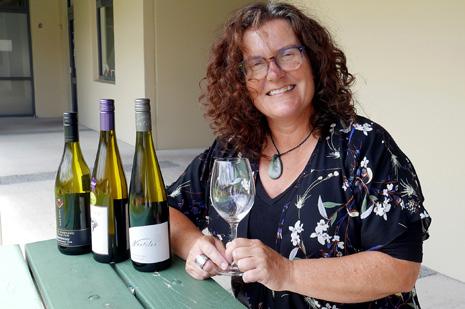
THE PRIDE Marlborough cellar door hosts have in their product is tangible, says hospitality and leadership trainer Marg Main.
Marg, who provides training around the country through her company Turning Tables, recently ran two courses in Blenheim for cellar door hosts through Wine Marlborough. Wine Marlborough’s Sarah Linklater says when Covid-19 forced the industry body to cancel its annual Cellar Door of the Year competition, it decided to offer some training for cellar door hosts instead. “Last year was quite exceptional, and we didn’t feel able to send out secret shoppers when some cellar doors had only just re-opened.”
The two sessions were attended by a good range of businesses, including about half the cellar doors currently open in Marlborough. Marg says participants enjoyed discussing what was different and what was the same at the cellar doors, regardless of size. “What I found and really enjoyed is that there was a lot of really genuine passion and a lot of pride. People are really proud of their brands and their products. It feels like there is a lot of heart and soul here at the moment.”
The closing of New Zealand’s borders to international visitors has really changed the situation for cellar doors, Marg said. “There’s definitely a feeling of ‘gosh how do we keep encouraging people to try more things when we have a limited pool of visitors?’” There has been a huge change in the type of people visiting cellar doors, she says. “There are a lot more local people coming in with some knowledge about wine and wanting to develop more.“
Hosts have more time to spend with individual customers, which wasn’t possible with big groups coming off cruise ships, she says. “Customers are people enhancing their existing knowledge about Marlborough wine, rather than starting from ground zero… It’s quite different now.”
Marg says people are enjoying showcasing wine to New Zealanders. “Parts of it are easier to talk about - the language is shared, people are more familiar with Marlborough and New Zealand wine.” She was surprised by a view expressed at one session that cellar door hosts didn’t necessarily need much knowledge about how wine is made. “It’s a bit like the Air New Zealand safety video - it is better to know it and not need it, than to need it and not know it. You have to have it in reserve.”
Marg started Turning Tables 13 years ago, after a career in hospitality as well as wine sales in Auckland, and a couple of vintages making wine and running a cellar door in Hawke‘s Bay and Martinborough. The need for her current business became apparent while selling wine, and hearing clients talk about training, she says. “People didn’t know where to get help for their staff.” Now she works on leadership, innovation, communications, and managing teams within the wider hospitality sector. How people work with their customers is important, particularly around communications and building rapport, she says. “People buy from people they like.”
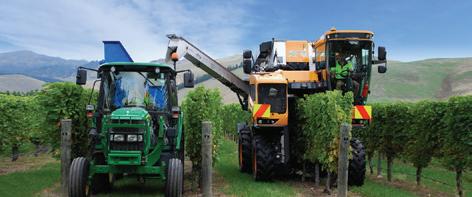
Biosecurity Watch
BEN RICHARDS, grower liaison officer with Indevin New Zealand, recently developed and began the implementation of a company-wide biosecurity plan for Indevin’s vineyards. New Zealand Winegrowers biosecurity and emergency response manager SOPHIE BADLAND caught up with him to see how he’s found the process so far.
Ben has worked for Indevin in the grower liaison officer role for two and a half years now, after six months as a viticulture technician. Studying a Bachelor of Viticulture and Wine Science at the Eastern Institute of Technology in Hawke’s Bay helped confirm that viticulture was where he wanted to be in the future, offering a career pathway with the opportunity to combine his farming background and his interest in both science and business, as well as the appeal of travel.
Ben’s current role spans a variety of tasks and offers plenty of opportunities to upskill. On any given day he could be out in the vineyard walking the rows, planning or managing harvests, consulting with contract growers and helping troubleshoot issues within their vineyards, providing advice on vineyard management and developing process efficiencies, checking fruit quality and incidence of pest and disease and, more recently, working with growers through labour shortage issues as a result of Covid-19. He learns a lot from the growers he works alongside too, saying they know their vineyards best. “They know what works for them and what doesn’t.”
His foray into biosecurity preparedness began with the 2019 Young Viticulturist of the Year competition. He won the Marlborough regional competition and went on to become runner-up in the national final. The finalists were tasked with developing a business case for implementing an on-site biosecurity plan at their home vineyard, and then presenting their case to the judging panel in the final competition. While Indevin already had protocols in place that encompassed managing many biosecurity risks to their vineyards, nothing was formalised into a plan. “The Young Vit competition made me think and consider the risks to the business – what would we do in a biosecurity emergency? The project opened our eyes further to the possibilities of what could go wrong and where we could improve.”
After the competition, Ben attended a local biosecurity planning workshop, updated his plan and sought feedback from the New Zealand Winegrowers (NZW) biosecurity team, checking alignment with NZW’s biosecurity best practice guidelines. He was lucky to find plenty of support from his colleagues and managers at Indevin. “I was consulting the team throughout the project. A biosecurity plan had been on our radar, but we hadn’t got there yet, so this assignment was perfect timing. It was good to work through it, get it formalised and then start implementing it.”
So how difficult has the plan been to implement? “My aim has been to make biosecurity its own programme, like health and safety, pest and disease management or sustainability. I’ve been working on the small wins, such as getting people on board making use of the NZW resources, and developing our programme structure so we could secure a dedicated budget. I’ve adjusted our
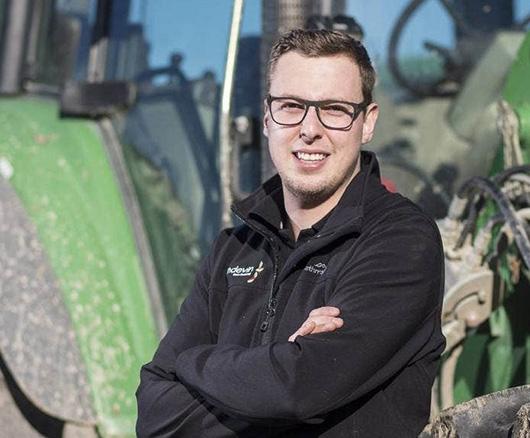
Ben Richards
IF YOU SEE ANYTHING UNUSUAL CATCH IT. SNAP IT. REPORT IT.


Call MPI biosecurity hotline 0800 80 99 66
Ben Richards
contractor agreement and developed a biosecurity checklist for our vineyard managers covering questions about vehicles, machinery and sheep, covering where they’ve been used previously, providing Animal Status Declarations (ASD), etc. If any red flags arise from the questions, we then investigate. We’ve also made biosecurity protocols part of our induction for new staff and contractors. Currently we’re talking with contractors for harvest and we’ll be making sure no red flags arise.”
Biosecurity will now be included in the budget in the years to come. “We want to develop some site-specific signage, put some biosecurity kits together for our vineyard managers/grower liaison team. There are a lot of other nice-to-haves, many things we could do in time if we had the budget, for example, better, potentially automatic, washdowns in high-travel areas where a lot of vehicles are going onsite.” He acknowledges it comes back to a cost/ benefit analysis. “A lot of the things we could do may have no immediate benefit, so it’s about balancing the business’s priorities and taking a long-term view to improvement.” Taking an educational approach and working with contract growers to encourage better biosecurity is also in the longterm plan, especially at sites where biosecurity hazards, such as Chilean needle grass, are already present.
For those who are thinking about undertaking biosecurity planning for their vineyard, Ben’s messages are simple. “It’s not that hard to do. For me, it was all about talking to people. Talk to the NZW biosecurity team, talk to your neighbours, talk to your team and your managers, talk to your contractors. There are some easy wins which could potentially save the vineyard and even the industry a lot of trouble. It’s your investment, if you want your contractors to follow certain protocols, talk to them about it. It’s all about communication, asking questions, working together, and educating yourself on the risks and how to mitigate them. We can start front-footing some of this stuff, it’s not that hard.” Thanks to Ben for making the time to share his insights with us. NZW has produced some resources to assist members with biosecurity planning. These can be downloaded from nzwine.com/en/sustainability/biosecurity or hard copies can be requested free of charge by emailing biosecurity@ nzwine.com. The team is happy to help anyone who would like assistance using the resources or developing a vineyard biosecurity plan.

Industry News
Southern Pinot Noir Workshop
If you could bottle New Zealand’s wine industry collaboration and collegiality, it might look a little like the Southern Pinot Noir Workshop. Viticulturists and winemakers from around the country gathered in Hanmer for four days in late January, to taste, assess and comment on unfinished barrel samples from the 2020 vintage.
Winemaker and educator Lynnette Hudson, who organises and MCs the event, says the entire purpose of the workshop, founded by Larry McKenna in 1991, is to share information and learning in order to improve viticulture and winemaking techniques. As well as a formal blind tasting and critical analysis of the 2020 samples, the group also assessed bottled Pinot Noirs from 2019, in a more informal process.
Winemakers are also encouraged to bring faulted wines along to the workshop, engendering open discussions on dealing with such issues. Lynnette says the impact of the gathering over the past three decades has been “exponential”, with the workshop unrivalled in terms of its contribution to the overall improvement of Pinot Noir in New Zealand, thanks to both viticulture and winemaking techniques.
She says collegiality drives the workshop, with everyone focussed on improving New Zealand’s Pinot Noir production, across the board. And the tastings were a treat, with the 2020 vintage “looking awesome” and 2019 revealed as an “amazing vintage”, says Lynette.
Nautilus winemaker Clive Jones agrees that the standard of the 2020 barrel samples and the 2019 finished wines “was amazing”. Clive went to his first Pinot Noir workshop in 1999 and has attended every two or three years ever since. “It’s a rare occassion that you are with a group of people for four days and focussed on one variety,” he says. “It’s a time out and a very open honest environment where you always learn something.”
of Directors and Economic Development New Zealand, says she welcomes the opportunity to lead NMIT through the next two years as the transformation of a national vocational education system is rolled out. “My priority will be to ensure that NMIT is resourced and positioned to effectively partner with iwi and collaborate with employers across the Top of the South to deliver quality education outcomes that support the economic prosperity of the Nelson, Tasman and Marlborough regions.”
New Board Chair for NMIT
Te Pūkenga council has appointed Tracy Johnston to the chair role on the Nelson Marlborough Institute of Technology (NMIT) Board. Tracy was invited to step up to the role, having served as deputy chair since April 2020, when NMIT became a subsidiary of the newly formed Te Pūkenga – New Zealand Institute of Skills and Technology. “Tracy’s background in offshore tourism, viticulture, governance and business leadership provides the NMIT Board with excellent, well-rounded leadership,” says Murray Strong, Te Pūkenga Council chair. “It is important that we maintain the current momentum to transform the sector for learners, and having Tracy step up to the chair role will help keep NMIT on track.” Tracy spent eight years as general manager of Destination Marlborough and runs Dayvinleigh Vineyard in the Wairau Valley with her husband Kevin. As well as consulting and serving on the board of NMIT and the Eastern Institute of Technology (EIT), Tracy is deputy chair of Wine Marlborough and deputy chair of the Fire and Emergency New Zealand Marlborough Local Advisory Committee. Tracy, who is also a member of the Institute
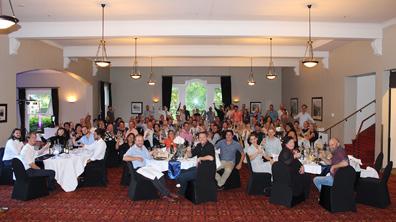
CLASSIFIEDS 5 VINEYARD NETTING REELS (INDAC)
$60 individually or $250 for the lot Call: 03 570 5218
CLASSIFIEDS FOR LEASE Bare hillside vineyard in Brookby Road. 1.2Ha more or less. Fully trellised and reticulated irrigation. Has been dormant for 3 years. Negotiable terms Call: 021 0236 5823
Sophie Parker-Thomson MW
Marlborough’s Sophie Parker-Thomson is one of 10 new Masters of Wine. She is the only New Zealander in the new group, bringing the country’s MW count to 15, out of the 418 across the globe. Sophie is co-owner of Blank Canvas Wines in Marlborough, which she runs with her winemaker husband, Matt Thomson. They also recently launched a consultancy business - Lock, Stock & Barrel – which works from vine to wine. Sophie was a New Zealand consultant to the World Atlas of Wine (8th ed.) and a guest judge at the 2020 Marlborough Wine Show.
Thankfully, the Marlborough District Council - after a bit of arm twisting and the submission of a comprehensive fire plan - agreed to let us use the Conders Bend mountain bike park, and racing could proceed. Much thanks must go to Tom Trolove and the Wine Marlborough board for extending their fire insurance cover to include our event, plus the generous contribution Bryant Earthworks made to wetting down the site. Without these two key elements of our fire plan, it is unlikely we would have been able to race.
Racing got underway around 5.30pm in an attempt to shoehorn our event into the ever busier lives of local wine industry participants. The change in timing seemed to pay dividends, with a full field of approximately 88 riders spread evenly across 28 teams. Representation from junior teams (those under the age of 16 years) was down on previous years, but it was pleasing to see three allwomen teams registered on the night and some worthy competition among them.
At the end of the day, with the usual Pernod Ricard vs Indevin tussle out front, it was the father and son duo of Jeremy and Finn McKenzie, from Isabel Estate, that took line honours by a healthy 10 minute margin. Also new to the podium was Tanked Up! - one of the teams from Crown Sheetmetal, which has been a foundation sponsor since the event began in 2014. For the second year on the trot, the ever colourful team from Framingham took out the all-women team category and Marisco Vineyard’s Blood, Sweat and Bears, the best dressed.
A huge shout out must go to the rest of our wonderful and loyal sponsors - Chandler Glass and Packaging, Crown Sheetmetal, WineWorks Marlborough, Bikefit Marlborough, Boomtown Brewing Company and Tasman Future Foods. We hope to see just as many of you back, clean shaven and lycra–wrapped for BSBVIII. Matthew Mitchell is Marisco Vineyards’ general manager, winery
Blood Sweat and Beer
MATTHEW MITCHELL After a postponed first attempt last November, wine industry-based mountain bikers finally got a chance to race the seventh instalment of Blood, Sweat and Beers. But the January 29 race wasn’t without its dramas. Originally racing was set for Jentree mountain bike park, where hosts Justin and Tori Leov had committed a good deal of work to preparing a course and associated transition area for race day. Earlier in the week the fire risk for the Marlborough district was deemed extreme and this, in combination with the limited access into and out of the Jentree property, meant we needed to go looking for an alternative location.

GrapeRide gears up
After two false starts, registrations are now open for the Whitehaven Graperide 2021. Whitehaven marketing manager Andrea Craig says in a classic case of silver linings, having the event postponed twice due to Covid-19 lockdowns means more of Marlborough’s wine industry can be involved than ever before. “Having the ride on April 24 means that people who would normally be in the midst of harvest, now have the opportunity to be involved.” The event will start and finish at The Vines Village on Rapaura Road, with a kids’ ride, so those up to the age of 12 years can have a taste of the event, with a 5km ride through the vines. In another change, a newly developed mountain bike section offers two distances, and with e-bikes allowed in all categories, there’s opportunity for everyone to give the GrapeRide a go, says Andrea. graperide.co.nz

Wine Happenings
A monthly list of events within the New Zealand wine industry.
To have your event included in the March Wine Happenings, please email details to sophie@sophiepreece.co.nz by March 20. Due to uncertainty around Covid-19, there may be changes to some of these events. For more information, please use the contact supplied or email sarah@winemarlborough.nz
MARCH 1 Summer Feast – through to April 25 – marlboroughnz.com/events 4 Summer Cruise & Dine Series – with Punga Cove and Spy Valley, every Thursday until March 25 7 Forrest Wines Sunday Sessions. Every Sunday, from 1pm to 4pm, until April 25 - marlboroughnz.com/ events/ 12 Moa Friday night Cinema Series - Step Brother 7pm to 10pm - marlboroughnz.com/events 26 An Evening with Méthode Marlborough methodemarlborough.org/ APRIL 2-4 Yealands Classic Fighters Airshow 2021 23 Cawthron Marlborough Environment Awards – cmea.org.nz 24 Whitehaven GrapeRide (graperide.co.nz) MAY 2 Marlborough Biodiversity Forum. 9am to 3pm, Renwick Sports Centre (see pg 27) 7 #SauvBlanc Day 8 Saint Clair Vineyard Half (vineyardhalf.com)
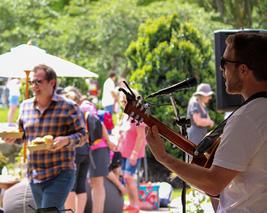
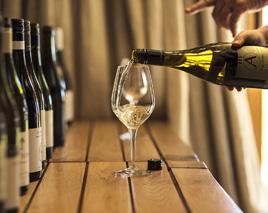
Sunday Session - March 7 Méthode Marlborough - March 26 #SauvBlanc Day - May 7




